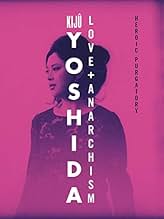Yoshida's films are luminous, ethereal creations, languid love affairs blown into abstract shape by memory and time. In the period when he studied/essayed the great Antonioni, he gave us films of simple, perhaps ponderous beauty. But with Eros+Massacre he finally unraveled. This is a companion piece to that labyrinth.
I can't imagine what it must've been to see this back in 1970 with fresh eyes, what possibilities of cinema it may have opened. Thirty years later I can see that some of the things Yoshida foresaw panned out, others didn't. But this film is a maddening enigma that stands the test of that time passed, meaning it's not simply a cultural artifact of New Wave and the time when the revolutionary spirit was believed to be a force of change, but an entire evolutionary phase of cinema, New Wave before and after.
If the movie works then as more than bold experiment, it's because these particular ephemeral struggles are abstracted, the lifetime they in turn inspire and disappoint is fragmented, past and future spinning out of original frameworks. What we get from this rearrangement is a snapshot of human beings caught into disparate planes of existence, wishing to see or connect or recognize meaning in what they do.
In a brilliant scene that takes place in the 80's, one of many flash forwards into future or imaginary time, the cast of characters is assembled in an open space to hold court. Unable to properly remember a key event, they turn to a figure perched in a high chair holding a film camera to arbitrate. This surrogate filmmaker allows them back in time.
We see how the two lovers met, we see where that love brought them. We get here a beautiful realization, that the man's greatest aspiration, who is a famous scientist, is to be a good husband to his wife. The camera looks back at Mariko Okada, standing a little back from her husband being interviewed, and we see her gracefully, stoically looking out a window. Yoshida's gentle tribute to the love of his life, his wife in real life.
We see an entire life, shared by these two people, be trapped in moral dilemmas and modern anxieties, thought to be important at the time, lifechanging, with hindsight though nothing but trivial. We see them struggle to remember or forget. Yoshida gives us here a bitter last goodbye to the spirit of '68, showing us how the romance with the social struggle grew sour. These ideas having led nowhere, our only chance for happiness is with our other half that completes us. The one romance that matters.
The film is the final moments of consciousness, memory looking back upon itself.






















